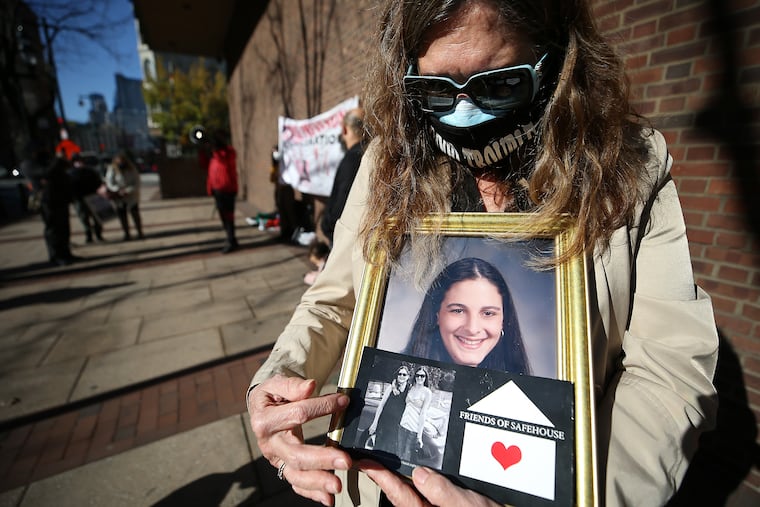Federal appeals judges hear arguments in government bid to block supervised injection site
The hearing was the next step in a lengthy court battle to open the first supervised injection site in the country.

A panel of federal appellate judges on Monday grilled representatives from Safehouse — the nonprofit formed to establish a supervised injection site in Philadelphia — and the U.S. Attorney’s Office that’s attempting to block the site from opening.
The hearing was the next step in a lengthy court battle to open the first supervised injection site in the country — a place where people in addiction can use drugs under medical supervision, be revived if they overdose, and access treatment.
Arguments during the hearing touched on many of the same legal issues that arose in the early stages of the case. At issue is a War-on-Drugs-era law known as the “crackhouse statute,” which prohibits the operation of a facility for drug use.
» READ MORE: Facing pandemic and protests, Philly too ‘frayed’ for a supervised injection site right now, judge rules
U.S. Attorney William M. McSwain has argued that Safehouse violates the crackhouse statute; attorneys for Safehouse have countered that their purpose is to save lives, not promote drug use, and that supervised injection sites are urgently needed in a city where three people die of an overdose each day.
The federal judges who listened to arguments Monday — Thomas L. Ambro, Stephanos Bibas, and Jane Richards Roth — offered little insight into which way they might rule, pressing both McSwain and Safehouse attorney Ilana Eisenstein on their interpretations of the crackhouse statute and how it applies to Safehouse’s proposal.
City health officials have been advocating for a supervised injection site for more than two years, as the deadly synthetic opioid fentanyl has contaminated much of the drug supply and fatal overdoses have skyrocketed.
After Safehouse formed in late 2018, McSwain filed a civil lawsuit asking a judge to declare the entire operation illegal before it could open, but U.S. District Judge Gerald A. McHugh ruled in the fall of 2019 that a supervised injection site would not violate federal law.
By February, Safehouse announced it was opening a site in South Philadelphia — a neighborhood second only to Kensington in fatal overdoses — but scrapped those plans after widespread outcry from residents and City Council members.
Then, this summer, amid the coronavirus pandemic and protests around the city over the death of George Floyd, McHugh granted McSwain’s request to stay his original ruling until the Third Circuit could hear the case. McHugh said at the time it was “the wrong moment for another change to the status quo” because “the nerves of citizens are frayed by fear and uncertainty.”
On Monday, advocates for the site staged a protest outside the federal courthouse while the panel of judges acknowledged that the “crackhouse statute” is open to wide interpretation.
“If we were sitting around talking about this, you would have five attorneys in a room and probably have five different opinions,” Ambro said. Later, he called Safehouse’s intentions “really wonderful" and said the proposal could save lives.
“But,” he said, “we’re stuck with the words of the statute.”
Much of Monday’s hearing was spent posing hypotheticals to the attorneys in an effort to clarify those words.
Ambro asked McSwain whether parents who let their child inject drugs in their home under supervision — so they could save them from overdose — would be prosecuted under the crackhouse statute. Then he followed up: What if the child didn’t live at the house at all, and only came home to use drugs? What if they brought a friend?
“As you add more and more people, it comes closer and closer to a line of liability,” McSwain said, adding that Congress had been concerned about preventing “concentrated drug use” when they enacted the statute. But, he said, parents who let a child use drugs in their home would likely not face prosecution.
“The reason we’re giving you so many hypotheticals,” Ambro said, “is that we’re trying to see what are the consequences of whatever decision we write.”
Eisenstein told the panel that Safehouse’s purpose is to prevent overdose deaths, not to promote unlawful drug use or trafficking, and compared Safehouse’s operations to an emergency room.
“You’re providing so that people can use on site,” Bibas told her. “This is not some fluke or thing that’s going to happen on Safehouse premises. This is not diabetics [injecting] insulin.” Eisenstein countered that addiction itself is a disease, and that Safehouse is trying to treat its effects — including overdose.
But Ambro asked whether the law should be interpreted simply as prohibiting anyone from making a place available for others to use illegal drugs.
“I think if that were the interpretation of the statute, then McSwain’s interpretation of parents who allowed a child to come use at their residence would be different," Eisenstein responded.
The judges questioned McSwain and Eisenstein for about two hours and said they would issue their ruling at a later date.
Ronda Goldfein, Safehouse’s vice president and the executive director of the AIDS Law Project of Pennsylvania, said the nonprofit was “grateful” to present its arguments in court again. “Our hope," she said, "is the Third Circuit will agree we will have a lawful purpose, that the stay will be lifted and we will have an opportunity to move forward and provide these evidence-based, lifesaving services.”